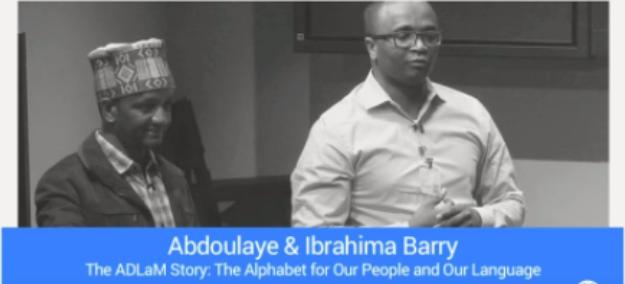This is the third and concluding part of this blog series based on an interview I held with Abdoulaye and Ibrahima Barry. In the first part, I briefly introduced the creators of the ADLaM script and their journey so far. The second part dwelt on the factors which mitigate the promotion and use of indigenous languages. Here, I share the roles of various parties in the preservation of indigenous languages around the world.
“We have been working on ADLaM for thirty years, but some languages don’t have that time to spare. […] It is really up to the community, with the support of the government, university professors, scholars and linguists. […] If we care about the world and its heritage, we need to care, whether or not the disappearing languages belong to our individual tribe or race; it’s our joint heritage as humans.” – Abdoulaye Barry
Governments have to invest towards the promotion of indigenous languages if the people would be motivated to learn them. Unless governments of nations take their own languages seriously, there may be nothing much any other party can do, other than make them aware of the importance of protecting their people’s heritage. Governments play the most important role since they are responsible for the creation of language policies.
In an era of technology, where everyone uses the internet, smartphones, and computers, the survival of any language depends greatly on its presence in, and support by, these tools. However, this decision lies in the hands of a few companies who own and operate these tools. Governments may collaborate with IT companies by asking them to support indigenous languages. In the case of Africa, for instance, making products, content, digital platforms, or systems available in indigenous languages results in increased accessibility to the people, since most of them are not educated in languages like English and French, which are more commonly used on electronic devices. This holds the potential of increased business profit for these companies, as the English- or French-speaking one-third of the African population is not necessarily the one with the highest purchasing power.
Non-governmental organisations, as well as (and especially) individuals, can contribute meaningfully to the preservation of indigenous languages. After all, the case in point – ADLaM – was majorly undertaken by two young boys, armed with nothing but raw passion, creativity, resilience, and determination. According to them, there is not one existing ADLaM centre in Africa that is being sponsored by NGOs or government entities; they are all grassroots initiatives. The very fact that ADLaM is a script developed for them by one of their own makes indigenous Fulani speakers very proud of it. So, they take initiative themselves by sending for people from other towns or countries to teach those who wish to learn to read and write their language in the ADLaM script.
Translators and other language service providers are not left out. They can help in making content available in indigenous languages, and rest assured that they would be put to great use, as people are drawn to content in their own languages. For some languages which are spoken by a few aged persons only, there might only be time to simply make tape recordings of those people speaking or telling stories.
By way of meaningful contribution, Translation Commons has designed a programme known as the ‘Global Language Digitization Initiative’. The goal of this initiative is to bring together professionals, researchers, and language communities to support the digitisation of endangered, indigenous, and minority languages, and to build capacity and professional networks to help all languages have equal opportunities and digital footprint online. Our partner coalition network includes the UNESCO IYIL Project, PanLex, the Script Encoding Initiative, and a host of others.
There is still so much to be done, so we invite you to be a part of this important mission. Partner with us today by signing up as a volunteer here: https://translationcommons.org/become-a-volunteer/
Thank you for reading through to the end!

